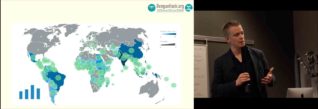- by Alison
Break Dengue award for creative prediction models
We are excited to have been part of the data hackathon organised by DengueHack.org on November 25th and 26th in Brussels.
We feel very fortunate that over 60 participants chose to spend their Saturday browsing through our datasets to tackle problems related to dengue. Everyone showed creativity and two teams were awarded the 2 * €500 prize.
During 36 hours data scientists, programmers and designers used a high variety of data to help build a model that would identify outbreaks sooner, predict future outbreaks, educate the public or determine new factors that could influence the dengue virus spread. We are very happy to reward the most actionable, scalable and sustainable ideas to break dengue!
10 teams were spontaneously formed, each one of them bringing a fresh perspective in the area. From analyzing Twitter streams and big data from the news, to looking at demographic and vegetation data, the teams proved to be not only determined in the fight against dengue, but also creative and technically competent.
The Break Dengue team decided to offer a €1000 prize to be split between two teams that fulfilled certain criteria put together by our jury. The winning ideas were asked to be actionable, scalable and sustainable. They were also supposed to combine at least two types of data: traditional data (like number of dengue cases), nonconformist data (like crowd surveillance or social media data) and “surprise” data (any type of data that is usually not used in the epidemiological conversation).
After careful consideration, our team picked two winning teams:
1.The Cube

This team focused on analysing the media and keywords used in communication, as well as on trends in social media and traditional media, using data mining techniques. Our jury considered this was a fresh idea that could support the “traditional” prediction tools created today, which only use traditional datasets;
2. Explodata

This team focused on trying to predict dengue, by analysing the presence of mosquitos in addition to other types of traditional data. The novelty of the approach included a look at the link between deforestation rates and dengue outbreaks.
The efforts from this Hackathon will not stop here. We will continue working with the data scientist community to follow up on these projects and ideas.
We would like to thank everyone who participated and helped make this contest a success. Special thanks go to John Snow Labs, our healthcare data partner.
We look forward to the upcoming hackathons and prizes in 2017! Stay tuned.

